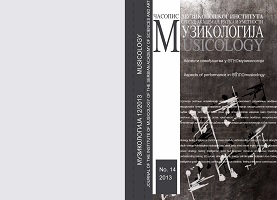Два погледа на југословенство у српској музичкој периодици међуратног доба
Two Views on the Yugoslav Ideology in Serbian Music Periodicals Between the Two World Wars
Author(s): Aleksandar VasićSubject(s): Music, Interwar Period (1920 - 1939), Sociology of Art, History of Art
Published by: Muzikološki institut SANU
Keywords: Yugoslav ideology; Serbian music periodicals - 20th century; South Slavic Singing Association; Croatian Singing Association; Bozidar Širola; Milenko Zivkovic;
Summary/Abstract: This study explores the relationship between the Yugoslav ideology as exhibited in Serbian music magazines published between the two world wars. These are the following journals: Music (1928–1929), Bulletin of the Music Society „Stanković” (1928–1934, 1938–1941; in January 1931 it was renamed The Musical Gazette), The Sound (1932–1936), Herald of the South Slavic Choral Union (1935–1936, 1938), Slavic music (1939–1941) and Review of Music (1940). I have excluded the magazine Musical Gazette (1922) from consideration because I have already discussed its ideological aspects in an earlier article (2009). Yugoslav topics in interwar music periodicals are addressed in an ecstatic tone by the music writers and editors (particularly immediately after the foundation of the Kingdom of Serbs, Croats and Slovenes); one also observes open dissent and criticism of undesirable, wasted tendencies. Signs of profound differences with respect to the fundamental aspect of Yugoslav ideology – i.e. on the question of the nature and degree of the unity of nations under the auspices of the ideology, appeared relatively early in these journals. I argue that three elements: open enthusiasm, criticism/polemic and fundamental differences, constituted a framework within hich the Yugoslav ideology was expressed in the Serbian musical periodicals. The third aspect has proved to be crucial. One could observe two different and even opposing views on the Yugoslav ideology. While some musicians strongly advocated integral Yugoslavism, others wanted the preservation of distinctive national features within this ideology. This division is illustrated by the writings of Croatian composer and ethnomusicologist Božidar Širola and Serbian composer and music critic Milenko Živković. The division in question culminated in the case of the South Slavic Choral Union, which Croatian Choral Union refused to join. Hence, Serbian music periodicals provide an insight into the fundamental ideological and political problem of the Kingdom of Yugoslavia.
Journal: Muzikologija
- Issue Year: 2/2014
- Issue No: 17
- Page Range: 155-166
- Page Count: 112
- Language: Serbian

